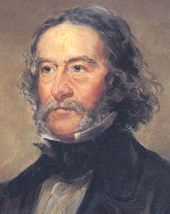 Walter Channing (April 15, 1786-July 20, 1876) was born, in Newport, Rhode Island, into a prestigious family. He earned his own reputation as Boston’s leading obstetrician, the first Professor of Midwifery at Harvard Medical School, and the first American physician to advocate the use of anesthesia in childbirth.
Walter Channing (April 15, 1786-July 20, 1876) was born, in Newport, Rhode Island, into a prestigious family. He earned his own reputation as Boston’s leading obstetrician, the first Professor of Midwifery at Harvard Medical School, and the first American physician to advocate the use of anesthesia in childbirth.
Channing’s parents were William and Lucy Ellery Channing. His father, a Princeton graduate, served as Attorney General for Rhode Island and as a United States District Attorney. His Harvard educated maternal grandfather, William Ellery, was a signer of the Declaration of Independence. His younger brother, Edward Tyrell Channing, became the Boylston Professor of Rhetoric and Oratory at Harvard, succeeding young John Quincy Adams who left academia for a career in diplomacy and politics. Walter’s older brother, the Rev. William Ellery Channing, minister of the Federal Street Church in Boston (Unitarian), 1803-42, was acknowledged to be one of the great preachers of his time. His 1819 sermon, “Unitarian Christianity,” reprinted many times, was taken as the platform of the American Unitarian churches.
Walter entered Harvard College in 1805. Among his classmates was Richard Henry Dana, a first cousin, later author of Two Years Before the Mast. Channing was expelled in 1807 for participating in the Rotten Cabbage Rebellion, a student protest against the inferior food they were being served. His B.A. was granted sixty years later, in 1867.
Channing was awarded an M.D. from the University of Pennsylvania in 1809. He studied in Britain for a year, taking advantage of the opportunities there to observe and participate in obstetrical cases. Returning to Boston in 1811, he began a general medical practice but quickly gained prominence in obstetrical cases. In 1815 he was appointed lecturer in midwifery at Harvard Medical School and in 1818 was named professor of Midwifery and Medical Jurisprudence.
Channing was one of the founding editors of the New England Journal of Medicine and Surgery, 1812, and an early editor of the Boston Medical and Surgical Journal. He was a member of the original medical staff at Massachusetts General Hospital and was instrumental in the creation, in 1832, of Boston’s Lying-In Hospital. He was the first physician to use anesthesia in operative obstetrics in the United States. He reported this in the New England Journal of Medicine and Surgery, 1847, and subsequently published A Treatise on Etherization in Childbirth to assure women and physicians of the merits of anesthesia. He served as Dean of Harvard Medical School, 1819-47.
Many of Walter Channing’s writings engaged a broad range of social and spiritual concerns. Two may be noted. In his “Introductory Lecture to the [entering] Medical School Class” of 1845, he discusses “the character of the physician”: “Suffering, exquisite pain, is in his path and it is to his office to remove it. Death is before him and it is his mission to avert it. He sees life in all its aspects, its darkest and its brightest. Here is kindness which never faileth. . . . The profession is in the public and private confidence after a manner in which no other one can be.”
Channing’s 1843 “Address on the Prevention of Pauperism” includes these remarks: “Poverty tells its whole story. It has no concealments. The undisguised spirit speaks through rags, simply and audibly. . . . What then are the causes of that condition which you have associated to prevent?”
A story illustrating Walter Channing’s sense of humor was often fondly told. A man came at his door and asked to see Dr. Channing. Walter asked, “Which Dr. Channing? My brother preaches, but I practice.” During his brother’s active ministry, Walter regularly attended the Federal Street Church but in 1841 he was among the small group that joined James Freeman Clarke’s newly founded Church of the Disciples. Channing died in 1876 in Brookline, Massachusetts.
Channing’s first wife, neé Barbara Higginson Perkins, the mother of his four children, Barbara, Ellery, Mary, and Lucy, died of consumption in 1822. In 1831 he married Eliza Wainwright who died three years later in childbirth. These tragedies, and the chronic illness and death of his daughter Lucy, produced profound sadness that was relieved by Channing in his strong faith and religious convictions.
Walter Channing published dozens of addresses and lectures, most of them pertaining to obstetrics. These can be found in the libraries of Harvard College in Cambridge, Massachusetts and Harvard Medical School in Boston. Among Channing’s more general writings are Thoughts on the origin, nature, principles and prospects of the temperance reform (1834), Lecture on the moral uses of the study of natural history (1836), An address on the prevention of pauperism (1843), Thoughts on peace and war : An address delivered before the American Peace Society (1844), My own times, or ‘Tis fifty years since’ (1845), Of the medical profession, and of its preparation (1845), The law of compensations (1855), and A physician’s vacation; or, A summer in Europe (1856).
Amalie M. Kass wrote “‘My brother preaches, I practice’: Walter Channing, M.D., Antebellum Obstetrician” for The Massachusetts Historical Review (1999) and a full biography Midwifery and Medicine in Boston: Walter Channing, M.D., 1786-1876 (2002). There are other biographical articles on Channing in the Dictionary of American Medical Biography, the Encyclopaedia Britannica (1962), and the Dictionary of American Biography.
Article by Spencer Lavan and Amalie M. Kass
Posted December 15, 2005